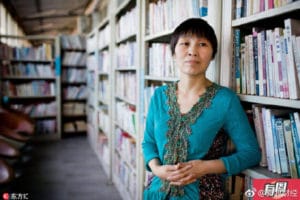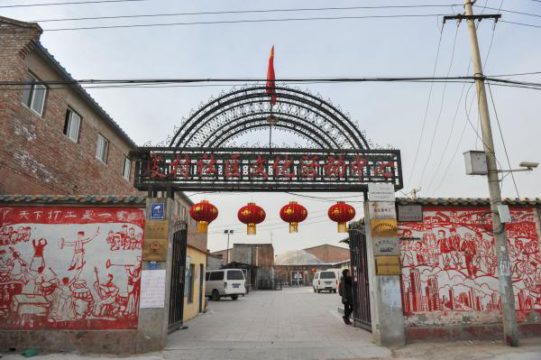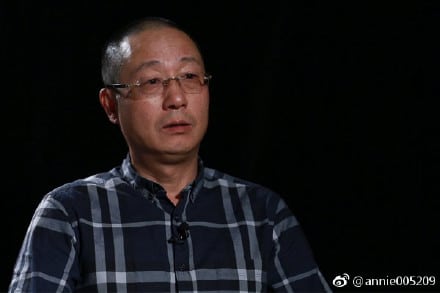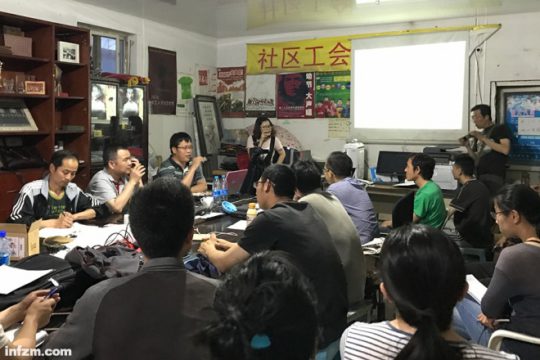Fan Yusu was the name on everybody’s WeChat in late April and early May of this year. An essay titled “I Am Fan Yusu” (“我是范雨素,” full translation here) spread like wildfire over Chinese social media, seemingly coming out of nowhere.
In some ways, the popularity of the essay in China is comparable to the recent hype over Alex Tizon’s essay “My Family’s Slave” on Western social media; this non-fiction story about ‘Lola’ Eudocia Tomas Pulido from the Philippines, who lived as a modern slave with an American family for 56 years, went viral on Twitter and Facebook in May. It gripped its many readers for exposing poignant problems in modern-day society that usually stay behind closed doors.
Fan Yusu’s account, in its own way, also revealed the harsh realities of an ever-changing society. China has an estimated 282 million rural migrant workers. The autobiographical tale focuses on the difficult childhood and adult life of one person amidst these 282 million – Fan Yusu herself.

“I Am Fan Yusu” was first published on Noonstory.com, an online literary platform by Shanghai news outlet Jiemian. A year prior to its publication, one of their journalists (Dan Bao 淡豹) headed out to Picun for an interview. Picun is a migrant village on the outskirts of Beijing, not far from the capital’s airport. It was here that Jiemian learned about the local literary club and its many poems and essays. One of these works titled “My Brother’s Dream” particularly stood out to them. It was written by the 44-year-old Fan Yusu, and the editor soon decided to publish her first story (“农民大哥”) in May of 2016.
A year later, Jiemian published a second essay by Fan, not expecting that it was this piece that would soon hit three million views and go viral across the country.
HER STORY
“Am I living in the Qing dynasty or is this new socialist China?”
In “I Am Fan Yusu“, Fan recounts her impoverished childhood in a rural village in Xiangyang, Hebei. Fan came to Beijing at the age of 20. Being a clumsy waitress with low expectations for her future, she rushed into an unhappy marriage with an alcoholic husband and had two daughters. When her marriage turned violent, she returned to her hometown for help. It was here that she discovered she was “merely a passer-by” in the village where she was born and raised. Her brothers could, but were not willing to help; her mother wanted to, but could not help.
Being the youngest of five siblings, Fan already learned at a young age that men have the final say in China’s countryside. Although her mother was a powerful local politician for more than forty years, she resigned from her official post the moment Fan’s oldest brother objected to his mother’s work.
The twenty-something Fan then returned to Beijing and took on a job as a nanny in a rich family, leaving her own two daughters behind in the village of Picun, where many other children grow up without a mother. She writes about life as a babysitter for the child of her boss’s mistress, while his dressed-up young wife waits on the sofa every night for her husband’s return: “I wondered if I was living in the Qing dynasty or if this was new socialist China.”

Despite her low educational background, Fan always had a thirst for knowledge and became a well-read person with a love for writing and literature. “If a person cannot feel happiness or satisfaction in life,” she writes: “they simply aren’t reading enough novels.”
ONE VOICE OUT OF MILLIONS
“We are all Fan Yusu.”
Thousands of netizens shared Fan’s essay shortly after it was published online. They responded to it with praise, saying it was a “unique piece of work” and even “Nobel-Prize worthy.” Why did specifically this essay become so hyped on Chinese social media?
The answer can be found in both the person of Fan Yusu herself as in her essay. The piece appealed to people because it uses simple yet powerful language. Some called it “unpolished”; a reflection of Fan’s own life and society at large.
The fact that Fan Yusu is in her forties, a single mother of two, and a migrant worker who has had a difficult life, makes her story carry more weight. She represents a voice that is generally lost in a media environment that is dominated by the middle class.
The popularity of this account also shows that a migrant worker with a low educational status can still be a successful writer. At a 2015 social gathering, Fan already mentioned that “‘migrant worker’ is not a derogatory term, just as ‘artist’ is not an elite one.”
“I Am Fan Yusu” also touches upon numerous issues such as domestic violence, divorce, gender inequality, the poor and rich divide, and a lacking healthcare system. These being issues that a lot of people have to deal with, the catchphrase “We are all Fan Yusu” (“我们都是范雨素”) soon made its rounds on WeChat and Weibo.
A NEW LITERARY MOVEMENT?
“Many in China’s elite literary circles do not touch upon society’s pain points the way Fan does.”
Fan Yusu’s account comes at a time when there is a surge of stories that tell the individual stories of ordinary people. An essay on Beijing’s crazy housing market titled “Housing Madness” (“房疯”) by an author named Chongzi (虫子) also saw its fair share of success in April of this year.
There is a growing appetite for these types of stories, and non-fiction websites such as Noonstory or Guyu Story provide a platform for them.
The popularity of such stories seems to relate to a growing weariness with established literature. On Weibo, many people shared their overall discontent with China’s literary circles in response to Fan’s essay. Many said they think of Chinese literature as being elitist and out of touch with ‘real life.’

This idea was backed by renowned novelist Zheng Shiping (a.k.a. Yefu 野夫), who applauded Fan’s writing in an interview in May. He criticized Chinese modern literature, saying that many in those “elite circles” never touch upon society’s pain points in the way Fan does.
Some Weibo netizens responded with sarcasm, saying: “Literature is literature. No matter if it touches upon society’s pain points or not, it always needs to follow the ideology of the Propaganda Department.”
ROOTLESS WOMEN OF CHINA
“A married daughter is like water that has been poured.”
Another major factor that has contributed to Fan’s sudden success, is that her account shows the disadvantaged position of women in China’s countryside. Rural women are often caught in a vulnerable position, facing various economic and social obstacles that hinder their emancipation.
“A married daughter is like water that has been poured,” is a saying about countryside women who go out to marry. They often leave the house empty-handed. Fan addresses this ‘floating life’ of rural women in her essay. Women from the countryside are ‘rootless’ because their status, location, and economic rights change depending on the role they have as daughter, bride, wife, daughter-in-law, or mother. All land ownership is generally in name of the fathers, husbands, and sons (Also see this article on China’s ‘rootless women’).
When a woman marries outside her hukou (household registration permit), she usually has to give up any benefits or rightful land ownership she had in her previous household. No matter if a woman gets married into a different household or joins China’s mass urbanization, she often is bound to end up in the lowest layers of society.
WHAT HAPPENED TO FAN YUSU?
“Why is Fan Yusu censored?”
Only three days after Fan Yusu’s essay went online and viral, the text disappeared from its original source [editor’s note: the essay is still available on some websites]. Different Chinese media reported that Fan Yusu, overwhelmed by the media’s attention, had gone into hiding in a mountainous village.
It was not just Fan’s essay, but also its reviews that were soon “harmonized” (被和谐, meaning ‘censored’). One popular Weibo blog titled “Why I Like Fan Yusu” was no longer accessible as of May 6 for “violating the rules” on Weibo. The sudden disappearance of the essay and its direct reviews also made many netizens wonder: “Why is Fan Yusu censored? (范雨素怎么被和谐了?)”
Although the real reasons are not exposed, there is ample speculation. In her account, Fan writes about her problems with social anxiety. The sudden attention for her personal life may have been so overwhelming that some suggested it is Fan herself who wanted her essay removed. Especially since there were also journalists who went to her Hebei hometown to interview her mother – something that she dreaded. “I’ve run into a sandstorm,” Fan Yusu reportedly told her friend about the flock of journalists swarming into her village.
But there were also those who said that reasons for censorship perhaps related to the fact that the account revealed details about the personal life of her former boss, a rich and powerful man who may have put a halt to online publications.
Another plausible option is that the publication was removed due to its criticism on Chinese society and politics. “Sharp criticism is just not allowed,” some people commented: “She is very realistic, and exposes some gloomy aspects [of society].” Although Chinese state media initially lauded Fan’s essay, it is possible that the hype surrounding it just grew too big too fast.
The sudden rise and disappearance of Fan Yusu has some resemblance to the hype surrounding Chai Jing and her documentary “Under the Dome” in 2015. This self-funded documentary on China’s pollution problem originally was supported by Chinese state media. It received over 200 million views before it was abruptly removed from Chinese websites a week after its release.
At the time, Greenpeace East Asia’s Calvin Quek told Bloomberg that it might had to do with the timing, just before the start of China’s plenary sessions: “It’s a reflection of some kind of political infighting that they chose to shut it down. The government censored the film because it got 200 million views, and they did not want it to dominate the twin conferences,” he said.
In Fan’s case, the hype came just before the Beijing One Belt, One Road Summit, a very significant event during and around which Chinese media emphasized the idea of China as a responsible and harmonious global leader.
Although Fan Yusu’s ‘sandstorm’ has gradually blown over by now, she still has not returned to her Picun home according to the latest media reports. Fan might have disappeared from the limelight for now, she is not forgotten.

Fan Yusu is the voice of a social class often ignored; she is a shining example that migrant workers can influence and shape the world of Chinese literature today. The heightened media attention for “the writers of Picun” (article in Chinese) is just one manifestation of how Fan Yusu has already made her mark – an unerasable one.
– By Manya Koetse
Follow @WhatsOnWeibo
©2017 Whatsonweibo. All rights reserved. Do not reproduce our content without permission – you can contact us at info@whatsonweibo.com.
The post Behind the Rise and Fade of China’s Literary Sensation Fan Yusu appeared first on What's on Weibo.